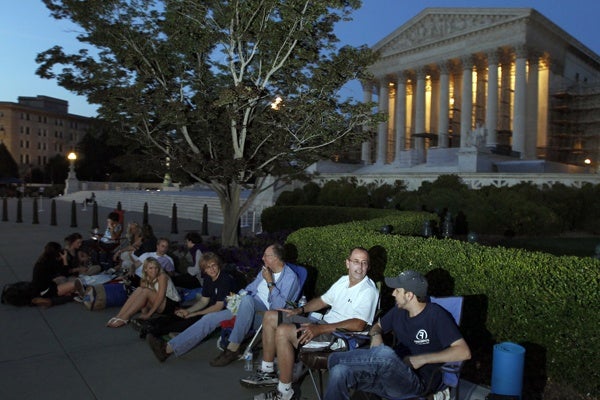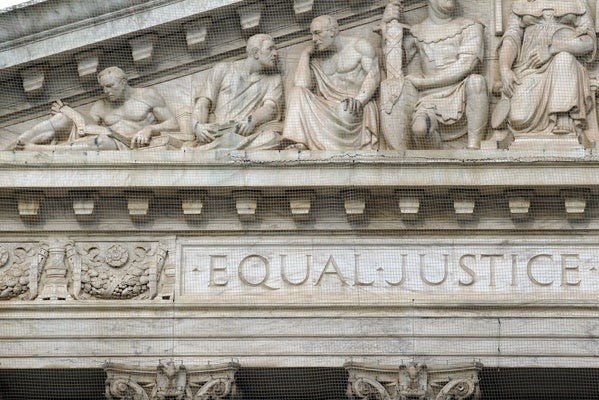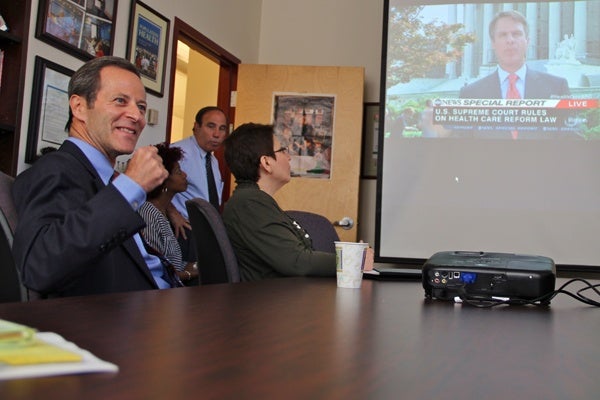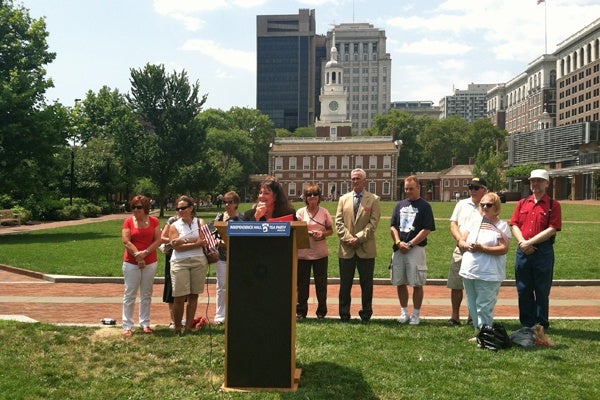Pa. governor disappointed by court’s health care ruling
-

-

-

-

-

The United States Supreme Court building in Washington, D.C.
-

-

-

-

-

-

-

-

Pennsylvania Gov. Tom Corbett, one of 13 state attorneys general to file a lawsuit to undo the Affordable Care Act’s individual mandate, says he is disappointed with the U.S. Supreme Court’s ruling upholding most of the act.
Corbett says the fact that the Court upheld the health care law under the federal government’s taxing authority means what he calls “Obamacare” is, in fact, a tax.
Corbett says his administration is still reviewing the opinion, as well as its implications on the issue of Medicaid expansion and the future of the required statewide health insurance exchange.
“You heard three days of argument on that law. The court had three months to review it, and we’ve had three and a half hours,” he said.
In remarks from the White House shortly after noon, President Obama hailed the ruling as “a victory for people all over this country.”
Local panel lauds ruling
Meanwhile, a panel of Philadelphia teachers and health-care executives praised the landmark decision.
Panel member Mary Naylor, a professor at the University of Pennsylvania School of Nursing, says despite the court’s ruling that state cooperation with new Medicaid regulations is not necessary, it will be impractical for states to opt out of the program.
“If we want to make sure that everyone — people who move from state to state — have access to the same opportunities,” Naylor said. “We’re going to have to work to create a condition where 50 states agree on some level to support the interest of consumers.”
Panel members also say the court has made it possible for the U.S. to move toward a national system where all citizens will have access to basic health coverage regardless of income or pre-existing condition.
Heart of the decision
In the key part of the decision, by a 5-4 vote, the court upheld the personal responsibility payment, also known as the individual mandate, as a legitimate exercise of Congress’ taxing power. Chief Justice John Roberts cast the key vote and wrote the majority opinion on that point.
Roberts stressed that he was upholding the provision only on the taxing power issue, not as an exercise of Congress’ power to regulate interstate commerce. The Commerce Clause argument has been used to justify many of the expansions of federal activity since the New Deal and has in recent years become a target of sharp conservative challenge.
Roberts’ opinion stressed that individuals retained the power to refuse to obtain health insurance, though that decision would come with a cost — paying a fine.
Theodore Ruger is a law professor at the University of Pennsylvania. He said the court made it clear that the only penalty for not buying insurance is that you pay more on your taxes.
“Nobody’s going to be thrown in jail, nobody is going to have their property taken away, and I think that’s important, and contrary to some of the ways the mandate has been characterized,” Ruger said.
A court majority held that the law’s plan to expand Medicaid coverage was constitutional, but with the important exception that the federal government could not penalize states for declining to join in expanding the reach of Medicaid, which provides coverage to lower-income Americans.
The court said the federal government is not allowed to take away from states its subsidy for previously existing Medicaid spending. In other words, if the federal government wants to prod states to go along with expanding the reach of Medicaid, it has to use carrots, not sticks.
Obama, Romney react
In this televised remarks, Obama said the ruling “re-affirmed a fundamental principle … no illness or accident should lead to any family’s financial ruin.”
The president said that although the focus in Washington during this political season will be about “who won and who lost,” that discussion, he said, “completely misses the point.”
“Whatever the politics, today’s decision was a victory for people all over this country whose lives will be more secure because of this law,” he said.
Republican nominee Mitt Romney gave a short statement this morning in reaction: “If we want to get rid of Obamacare, we have to make sure we replace President Obama.”
Speaker of the House John Boehner, a Republican from Ohio, said he’d work to repeal the law: “The president’s health care law is hurting our economy by driving up health costs and making it harder for small businesses to hire.”
States face choice on Medicaid
An analyst contacted by NewsWorks said he doubts many states would opt out of the expansion.
Joel Cantor, director of New Jersey Center for State Health Policy, says he thinks it’s very unlikely even Pennsylvania and Gov. Corbett, who was a party to the Florida suit, will be stubborn on this point.
“I think that eventually all states will implement it even if they don’t have to,” Cantor said. “It’s just too good a deal for them to refuse. If they choose not to implement it, they are basically guaranteeing an enormous charity care burden on their hospitals.”
Cantor noted that New Jersey Gov. Chris Christie has said he’d be willing to work with the Legislature to comply with the law if it were upheld.
“To now the ball is in his court. He can go back and negotiate with the legislature and come to a meeting of the minds on the [health insurance] exchange, ” Cantor said. “New Jersey is not really behind the curve here. Nationally we are probably middle of the pack in terms of readiness to implement health reform.”
In New Jersey, news of the Supreme Court’s decision spurred Democratic lawmakers on the move to fulfill the state’s responsibilities.
More than a month after Christie vetoed it, a group of lawmakers are rentroducing legislation to create a state health insurance exchange.
State Sen. Joe Vitale, a co-sponsor of the bill, says the governor should work with them to come up with a plan that works for New Jersey.
“Or the federal government will come in an do it, so I don’t think he’s that keen on the Obama Administration coming in here and designing health exchange,” said Vitale.
Vitale says talks with the Christie Administration over a new bill could begin as early as next week.
A sigh of relief
Twenty-eight-year-old Philadelphia resident Jane Feustel was pleased with the Supreme Court’s call.
She and other health law supporters worked hard to get out the message that the Supreme Court’s decision — and the intact provisions of the health law — will benefit uninsured people — as well as people who already have coverage.
Feustel has a chronic neurological condition that requires regular care. She was between jobs in 2009, when she moved to Pennsylvania from Colorado. She says she tried to “be responsible” and buy health insurance but was denied coverage because of her pre-existing illness. Feustel says she eventually found a job in the non-profit sector
“No job is a secure job in this economy and I could find myself there again, and I don’t want to deal with the stress of having to face being uninsured for an indefinite period of time, and having insurance companies deny based on something that’s out of my control.”
Impacts for consumers
The ruling means that several mostly popular provisions of the law will remain in effect. These include:
Allowing young people up to the age of 26 to remain on their parents’ health coverage if they are not covered through a job.
Rules barring insurers from denying coverage based on a pre-existing condition.
Others provisions slated to take effect in coming months are preserved by the court’s decision:
Millions of Americans will qualify for the expanded Medicaid program.
Many states will continue work setting up “health exchanges,” online marketplaces intended to make it easier for people to compare and choose affordable coverage.
Here is summary of the gist of the decision from the popular Scotus Blog:
“In Plain English: The Affordable Care Act, including its individual mandate that virtually all Americans buy health insurance, is constitutional.
“There were not five votes to uphold it on the ground that Congress could use its power to regulate commerce between the states to require everyone to buy health insurance. However, five Justices agreed that the penalty that someone must pay if he refuses to buy insurance is a kind of tax that Congress can impose using its taxing power. That is all that matters.
“Because the mandate survives, the Court did not need to decide what other parts of the statute were constitutional, except for a provision that required states to comply with new eligibility requirements for Medicaid or risk losing their funding. On that question, the Court held that the provision is constitutional as long as states would only lose new funds if they didn’t comply with the new requirements, rather than all of their funding.”
Surprise at vote breakdown
Analysts are still sifting through all the many nuances of the ruling, and dealing with the surprise that Justice Anthony Kennedy was not the deciding vote and not the author of the majority opinion.
Given how the court often splits 4-4 into liberal and conservative camps on big cases, Kennedy has become the crucial swing vote and writer on many rulings. Kennedy, who joined Justice Antonin Scalia, Clarence Thomas and Samuel Alito in opposing the ruling, filed a sharply worded dissent.
Local and national reactions
About a dozen members of the Independence Hall Tea Party Association gathered on Independence Mall this morning to lament the decision and to vow to undo it at the polls in November.
“I believe the Supreme Court of the United States has solidified the anger of the American people about the intrusion of this federal government into liberties. That clearly will ensure that in November Barack Obama is removed from office,” Tea Party member Michael Johns said.
A group of staffers at Thomas Jefferson University’ gathered in a conference room at Jeff’s School of Population Health to watch tensely as ABC-News relayed the first news of the ruling.
The 17 people gathered gave a round of applause as the word sank in.
“The whole building is breathing a sigh of relief,” said David Nash, dean of the school, said of the Obama White House.
“We feel pretty good that the constitutional issue has been resolved, the law, in a torturous way has been upheld, and as best as we can tell,” Nash said, “it’s full steam ahead for all of the delivery system reforms that already moving adhea too.” so this is great news, great news.
Asked whether anyone in the room had expected the court to uphold most of the law, not a single person raised a hand.
Based on early reports, John Culhane, a professor at Widener Law, said the justices seem to be clearing up a common confusion that the mandate means you have to buy health insurance.
“It’s a mandate in the sense that you either buy the insurance or pay a penalty,” Culhane said. “You don’t have to buy insurance, but if you don’t we we’re going to make you pay.”
The head of the Pennsylvania Pro-Life Federation reacted to the ruling with distress.
“This is a deeply disturbing ruling,” Michael Ciccocioppo said. “The law is riddled with so many dangerous abortion and rationing provisions that make all Americans vulnerable to any number of life-threatening mandates from the Department of Health and Human Services.”
The pro-ACA advocacy group Families USA predictably had a different reaction:
“Today’s Supreme Court ruling is a clear, unambiguous, and complete victory for long-overdue health care reform. It sends an unmistakable message that the building of a better, fairer health care system will continue to move forward.”
The National Retail Federation was displeased.
“As the voice of retailers of all types and sizes, we’re disappointed by today’s ruling,” Matthew Shay, CEO of the group, said in a statement. “The Court missed an opportunity to redress the many shortcomings of the law. As it stands, the law wrongly focuses more on penalizing employers and the private sector than reducing health costs.”
Curt Schroder, regional executive of the Delaware Valley Healthcare Council, an association of hospitals and health systems, called today’s ruling “a good thing for patients and hospitals in southeastern Pennsylvania.”
But the Pennsylvania Medical Society described the law, as it stands today after the ruling, as only a half-remedy:
“We are pleased that this decision will make health care insurance available to most Americans. However, the law continues not to address two important issues, medical liability reform and Medicare payment reform.”
But Antoinette Kraus, with the Pennsylvania Health Access Network, says her group is concerned about the limitations the court ruling placed on Medicaid expansion — allowing states to not participate and still keep some federal funding.
“Some states may choose to exclude the lowest income uninsured adults. Pennsylvania cannot be one of those states,” she said. “The Medicaid expansion will bring much-needed money and jobs to our state and help Pennsylvanians who are in the uninsured population.”
Background of the case
The Supreme Court agreed in November 2011 to hear appeals of two lower-court rulings on the Affordable Care Act.
One suit, filed by the National Federation of Independent Business, challenged a key provision of the act, the shared responsibility payment, also known popularly as the individual mandate. This would require individuals either to obtain health coverage, or pay a fine.
The second suit, filed by the state of Florida, challenged the expansion of the Medicaid program to cover more people. The law would have given the federal government the power to penalize states that did not step up to fund their share of the expansion. Medicaid is jointly funded by state and federal governments.
Lower appeals courts made multiple rulings on challenges to the law. Three courts upheld provisions of the law, while the 11th Circuit Court of Appeals struck down the individual mandate in one of the cases decided by the high court today.
Various appeals courts rejected lawsuits either on the basis that they were premature or the plaintiffs did not have standing.
The Kaiser Family Foundation has an excellent background paper on the legal fight over the law.
WHYY is your source for fact-based, in-depth journalism and information. As a nonprofit organization, we rely on financial support from readers like you. Please give today.

